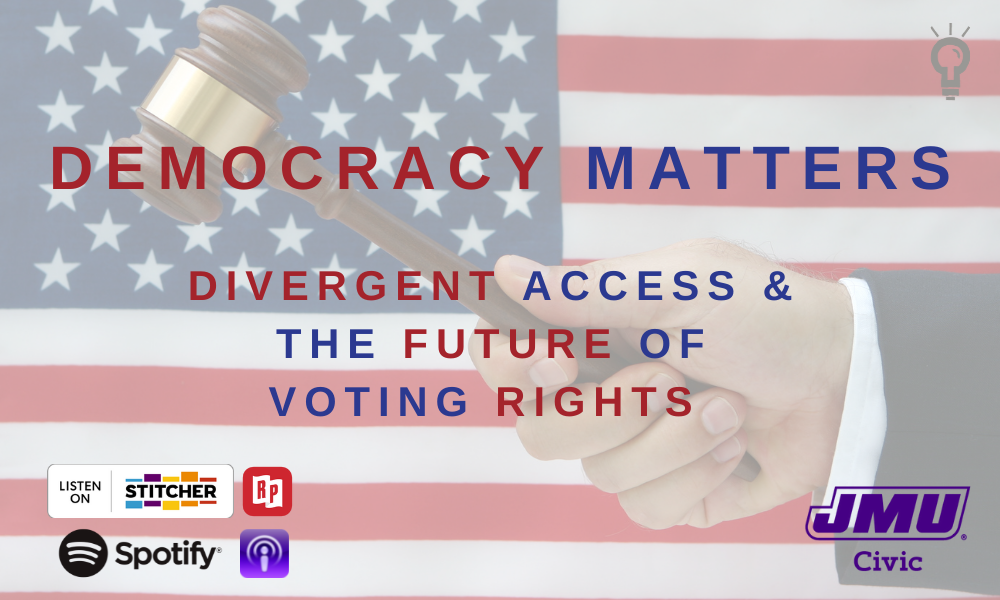Democracy Matters - Episode 64: Divergent Access and the Future of Voting Rights
News
SUMMARY: In the wake of the Supreme Court's Brnovich v. Democratic National Committee ruling, we are left asking what is a usual or unusual burden to voting and which voting restrictions might be more or less vulnerable to legal challenge. We talk with Michael Burns, the National Director for Fair Elections Center’s Campus Vote Project, about the history of voting rights and the implications of the Supreme Court’s decision on voting access and rights.
The Supreme Court just made one of the most important rulings in the last decade on voting rights. But let’s take a step back.
Congress passed the Voting Rights Act (VRA) in 1965 widely viewed as the most successful civil rights law in the nation's history. In its 2013 Shelby v. Holder ruling, the Supreme Court gutted a key provision of the VRA by no longer requiring state and local governments with a history of racial discrimination in voting to get pre-clearance from the Justice Department before making changes in voting procedures. Chief Justice John Roberts wrote for the court in the Shelby v. Holder decision that treating some states differently from others was unconstitutional. He also noted that Section 2 of the Voting Rights would be sufficient to police discriminatory voting procedures.
However, Section 2 was precisely what was at stake in the Supreme Court case of Brnovich v. Democratic National Committee. The Democratic National Committee brought the case to the Supreme Court based on two Arizona laws passed by Republican-controlled state legislature and governorship. The first law bars the counting of provisional ballots cast in the wrong precinct. The second provision of the Arizona law bars the collection of absentee ballots by anyone other than a family member or caregiver.
The 9th U.S. Circuit Court of Appeals found no evidence of such fraud in Arizona, and it struck down the ban on absentee ballot collection. The 9th U.S. Circuit Court said the ban violated Section 2 of the Voting Rights Act, which bars voting laws that have an adverse impact on minorities, denying them an equal opportunity to vote, in light of the "totality of the circumstances." The Arizona Republican Party appealed to the Supreme Court.
The Supreme Court issued its ruling on Brnovich v. Democratic National Committee on July 3, 2021, voting 6-3 along ideological lines to uphold the Arizona laws. Writing for the majority, Justice Samuel Alito made the case that burdens may inevitably result in “some” racial disparity, “The mere fact there is some disparity in impact does not necessarily mean that a system is not equally open or that it does not give everyone an equal opportunity to vote.” In his opinion, Justice Alito also wrote that preventing fraud was a “strong and entirely legitimate” state interest. The conservative justices on the court rejected the idea that racial disparity alone is sufficient to establish that a state denied everyone an equal opportunity to vote. Meanwhile, Justice Elena Kagan, writing for the minority, noted: “The majority says as little as possible about what it means for voting to be ‘equally open’ or for voters to have an equal ‘opportunity’ to cast a ballot. It only grudgingly accepts — and then apparently forgets — that the provision applies to facially neutral laws with discriminatory consequences.”
In the wake of the Supreme Court's Brnovich v. Democratic National Committee ruling, we are left asking what is a usual or unusual burden to voting and which voting restrictions might be more or less vulnerable to legal challenge. We talk with Michael Burns, the National Director for Fair Elections Center’s Campus Vote Project, about the history of voting rights and the implications of the Supreme Court’s decision on voting access and rights.
Links in this episode:
